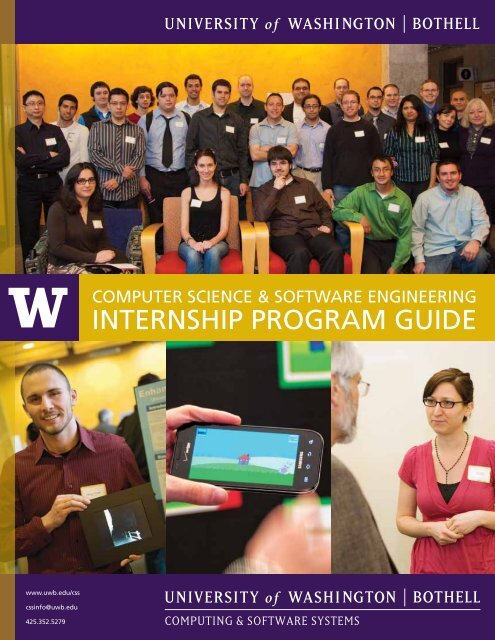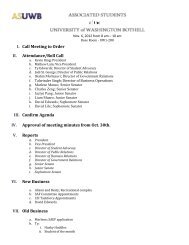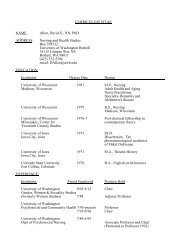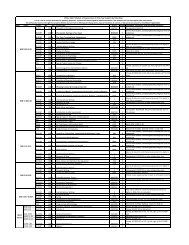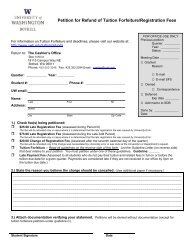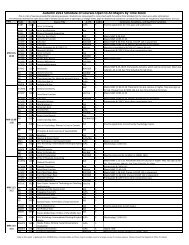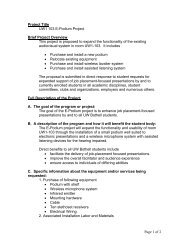internship program guide
INTERNSHIP PROGRAM GUIDE - UW Bothell
INTERNSHIP PROGRAM GUIDE - UW Bothell
- No tags were found...
You also want an ePaper? Increase the reach of your titles
YUMPU automatically turns print PDFs into web optimized ePapers that Google loves.
computer science & software engineering<br />
<strong>internship</strong> <strong>program</strong> <strong>guide</strong><br />
www.uwb.edu/css<br />
cssinfo@uwb.edu<br />
425.352.5279
computer science and software engineering (CSSE)<br />
cssE degree<br />
The Bachelor of Science in Computer Science and<br />
Software Engineering curriculum stresses computer<br />
<strong>program</strong>ming and people centered software development<br />
processes. Our aim is to educate students who can<br />
contribute to the entire software development ecosystem,<br />
including <strong>program</strong>ming, systems integration, test, design,<br />
requirements definition and analysis, project management,<br />
and technical communications.<br />
Interns will have completed almost all of their<br />
coursework by the time their projects commence. Core<br />
courses cover elementary <strong>program</strong>ming concepts; objectoriented<br />
design and development; data structures and<br />
algorithms; discrete mathematics; hardware and computer<br />
organization; operating systems; project management;<br />
software engineering; systems analysis and design; and<br />
technical writing. Students will also have taken several<br />
elective courses, which could include networks; databases;<br />
embedded systems; parallel and distributed systems;<br />
compilers; computer graphics; game design; scientific<br />
computing; digital signals and data analysis; humancomputer<br />
interaction; expert systems; computer vision;<br />
technology business concepts; or public policy, among<br />
many other topics.<br />
cssE <strong>internship</strong> <strong>program</strong><br />
One of the largest computer science degree <strong>program</strong>s in<br />
the Pacific Northwest, the Computer Science and Software<br />
Engineering Program at the University of Washington<br />
Bothell places great emphasis on providing students with<br />
a uniquely interdisciplinary educational experience. A<br />
key part of this experience is a capstone <strong>internship</strong> that<br />
requires students to integrate what they’ve learned during<br />
their studies in order to accomplish a substantial, realworld<br />
project.<br />
Interns work for a total of at least 400 hours, typically<br />
over one or two 10-week quarters. Each student has a<br />
faculty advisor who will work with your organization and<br />
the student to ensure that the work satisfies UW Bothell<br />
academic standards for a capstone experience, and that<br />
it is completed as specified in our Cooperative Education<br />
Contract. The faculty member can also serve as a liaison<br />
with a mentor or supervisor in your organization, who<br />
will be requested to provide an evaluation of the student’s<br />
work when the project is complete. As a part of his or her<br />
graduation requirement, each student will participate in<br />
one of our quarterly colloquia and present a summary of<br />
the project.<br />
sponsor’s requirements<br />
You will work with the CSSE Internship Coordinator<br />
to prepare an <strong>internship</strong> description that outlines the<br />
project(s) that are available in your organization for our<br />
students’ participation. Internships may be either paid or<br />
unpaid, individual or team; what is important is that the<br />
scope of work provides students a substantive, immersive<br />
experience that draws upon multiple competencies that<br />
they have gained during their studies. It is possible for<br />
students to work on projects that involve proprietary<br />
information as long as progress and performance can be<br />
shared with a faculty advisor and the general nature of<br />
those activities—and their relationships to UW Bothell CSS<br />
coursework and competencies—can be presented publicly<br />
at the CSSE colloquium.<br />
Once project descriptions are made available to<br />
students, they will contact you directly. You are responsible<br />
for screening <strong>internship</strong> applications; the UW Bothell CSS<br />
Program cannot perform this function for you. You are, of
student intern EXPERTISE<br />
Besides the specific topics and technical knowledge that students will bring to your project, you can also expect that<br />
they will be prepared to integrate what they have learned from multiple courses into their singular capstone experience.<br />
To help emphasize this integrative process, we have developed a system of cross-cutting competencies to define and<br />
describe our students’ educational experience. These competencies are broken into two broad categories: foundational<br />
competencies that are found in every CSSE core course and technical competencies specific to software engineering and<br />
computer science that are developed across the set of individual courses.<br />
Foundational Competencies<br />
Foundational competencies span three areas:<br />
• Analysis and problem-solving. This area emphasizes<br />
the gathering information to support decisionmaking;<br />
solving problems efficiently; thinking through<br />
problem solutions in a systematic manner, ensuring<br />
that work done is of the highest quality; identifying<br />
novel, creative approaches to problem-solving; and<br />
demonstrating the ability to learn continuously as new<br />
challenges arise.<br />
• Interpersonal skills. This area focuses on the fact that<br />
software and systems development almost always<br />
involves teams. We emphasize collaborative team<br />
building; effective leadership as a contribution to these<br />
teams; effective written and oral communications;<br />
and nimbleness in the face of changing, uncertain<br />
conditions.<br />
• Management skills. Our graduates learn the<br />
importance of the process of developing software in<br />
ensuring high quality. This includes managing projects<br />
to keep them efficient and within time and budget<br />
constraints; administering projects’ compliance with<br />
desired standards and reporting requirements; acting<br />
in anticipation of possible problems and opportunities<br />
to manage risk; and, overall, maintaining a careful<br />
focus on the user’s needs.<br />
Technical Competencies<br />
Technical competencies address business, <strong>program</strong>ming,<br />
and operational aspects of software systems:<br />
• General business, social, and technical. Students are<br />
expected to understand the business, mathematical,<br />
and social contexts in which software development<br />
takes place. This includes analyzing project cost;<br />
benefit and risks; evaluating alternative technologies;<br />
re-engineering business processes; understanding<br />
the mathematical theory underpinning computing<br />
applications; and writing the full range of documents<br />
associated with computing systems.<br />
• Application <strong>program</strong>ming. We develop an<br />
appreciation of the extent of the full software<br />
development life cycle: requirements, design, testing,<br />
implementation, <strong>program</strong>ming (both singly and in<br />
teams), and quality assurance. Core courses emphasize<br />
this full range, while electives focus on a variety of<br />
techniques for addressing each part.<br />
• Infrastructure/operations. Students gain experience<br />
with the range of hardware, software, and professional<br />
development necessary for successful systems. They<br />
learn to integrate different technologies across multiple<br />
platforms; to take advantage of the interrelationships<br />
among hardware, software, and operating systems;<br />
to evaluate and troubleshoot system performance,<br />
to manage systems and networks; and to support<br />
developers and users in their understanding and use of<br />
computer hardware and software.<br />
course, free to apply any recruitment procedure that you<br />
use in the normal course of employee hiring. Students are<br />
also responsible for identifying a faculty advisor (if you<br />
have an ongoing relationship with a CSS faculty member,<br />
please feel free to suggest that person) and completing<br />
a Cooperative Education Contract to your and their<br />
advisor’s satisfaction. The Contract will require signatures<br />
from the student, a representative of your organization,<br />
and the faculty advisor.<br />
During the project, the student will be responsible<br />
for communicating their progress regularly with their<br />
faculty advisor. As the project nears completion, and the<br />
Colloquium approaches, the student may wish to consult<br />
with his or her mentor in your organization regarding the<br />
required poster and oral presentations. The student will<br />
also request an evaluation letter from the mentor to the<br />
faculty advisor. We hope that you can join us on the day<br />
of the Colloquium to see your intern’s presentation, to<br />
experience the breadth of <strong>internship</strong> experiences, and to<br />
network with other sponsors and CSS faculty and staff.
COMPUTER SCIENCE & SOFTWARE ENGINEERING<br />
18115 Campus Way NE<br />
Bothell, WA 98011-8246<br />
425.352.5279<br />
cssinfo@uwb.edu<br />
www.uwb.edu/css


